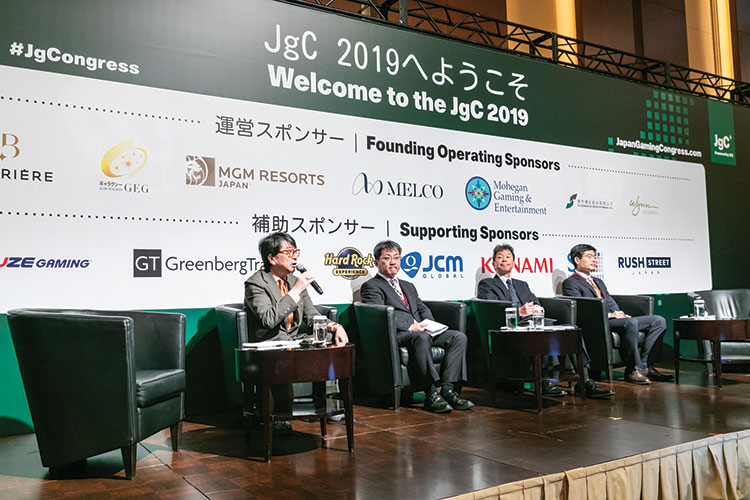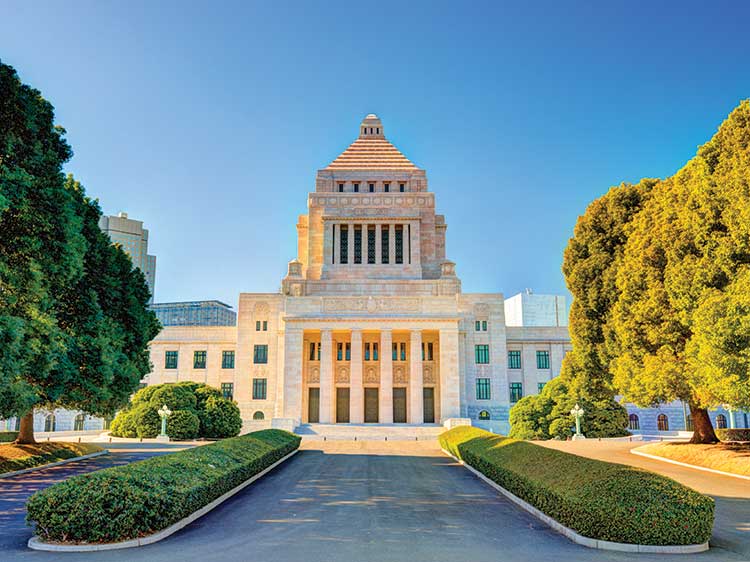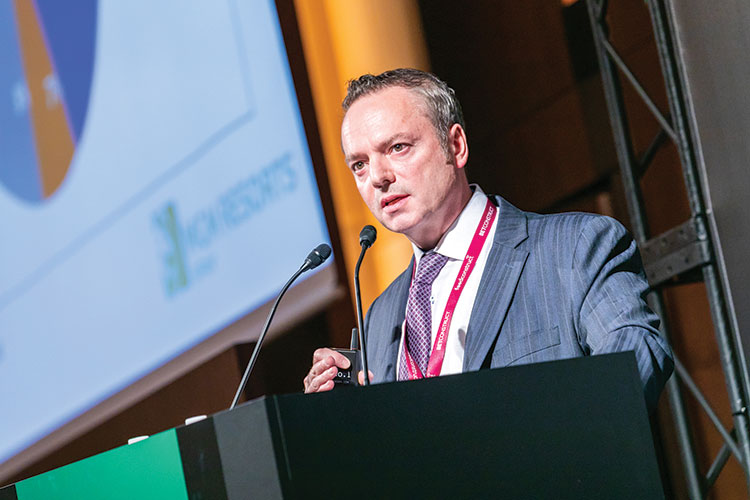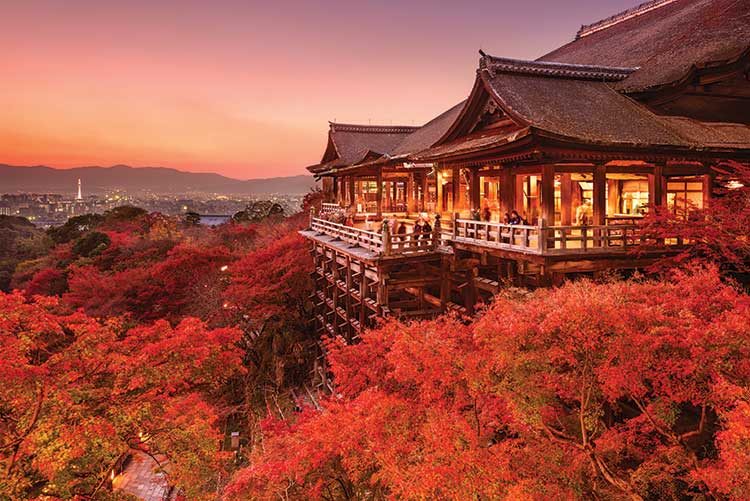The Japan Gaming Congress held in Tokyo in May provided attendees with valuable insights into the latest developments regarding the establishment of IRs, but could the language barrier between local officials and foreign stakeholders be complicating the issue?
During this year’s Japan Gaming Congress (JgC), attendees were informed on a series of topics ranging from public perceptions of integrated resorts (IRs), non-gaming topics including F&B and entertainment, and the vision that operators participating in the event have crafted for the market. One of the things that became even more apparent was how much vital information can be lost in the translation from Japanese to English, or vice versa, between speakers and officials attending the event.
Even the smallest difference in the selections of words can make a world of difference in how regulations, the vision and the feasibility of the three initial IRs will be decided over the coming months. Part of the reason the market is where it is today is that it is difficult to find the best words or phrasing that works equally well in both languages. In order for the Japan market to succeed, it is imperative that nothing gets lost in translation so the market is established in the best framework for IRs that the world has developed since Singapore launched its process in the mid-2000s.
 One thing not lost in translation is the continued desire of the Japanese to drive tourism with a focus on the expansion of MICE (Meetings, Incentives, Conferences and Exhibitions). They have also expressed from the beginning the desire for IRs to serve as a hub for tourism to reach other parts of Japan, and the original IR Promotion Act passed in December 2016 served as the catalyst.
One thing not lost in translation is the continued desire of the Japanese to drive tourism with a focus on the expansion of MICE (Meetings, Incentives, Conferences and Exhibitions). They have also expressed from the beginning the desire for IRs to serve as a hub for tourism to reach other parts of Japan, and the original IR Promotion Act passed in December 2016 served as the catalyst.
However, one of the keys to the future of the Japan gaming market will be the establishment of the 300-plus regulations that will eventually be decided by the future Casino Control Commission, which will consist of over 90 employees and a budget of over JPY$6 billion (US$55 million). The process of establishing the Commission continues to move forward, even though the timeline has been delayed by a few months as the announcement of the Commissioners to the Casino Control Commission has been pushed back.
Meanwhile, the creation of the government office continues what will eventually propagate these rules as well as govern the entity once the commission is established. This new agency, whose funding was established through the last ordinary session of the Diet, will reside within the Japanese Ministry of Land, Infrastructure, Transport and Tourism.
 During JgC, one of the more informative panels that will help shape the future of integrated resorts was the final panel on the last day, featuring several C-Suite executives from some of the leading IR bidders. The panel highlighted some of the challenges that exist with the length of the licensee term, which is currently set at five years, and the ability to finance such an intensive project based on this term, which is relatively short compared to other major jurisdictions. In Macau, where the concessions of SJM and MGM were recently extended to 2022, all concessionaires are now on the same timeline where each is set to expire in 2022, providing most operators with a 20-year license term. Singapore has also recently renewed its two licensees with 10-year extensions and further investment in the market beyond the initial 10-year term that was set to expire.
During JgC, one of the more informative panels that will help shape the future of integrated resorts was the final panel on the last day, featuring several C-Suite executives from some of the leading IR bidders. The panel highlighted some of the challenges that exist with the length of the licensee term, which is currently set at five years, and the ability to finance such an intensive project based on this term, which is relatively short compared to other major jurisdictions. In Macau, where the concessions of SJM and MGM were recently extended to 2022, all concessionaires are now on the same timeline where each is set to expire in 2022, providing most operators with a 20-year license term. Singapore has also recently renewed its two licensees with 10-year extensions and further investment in the market beyond the initial 10-year term that was set to expire.
The five-year window in Japan provides difficulty for operators that are interested in the large and regional locations, as the scope and reach of these projects will require a significant amount of investment. Many public reports have estimated these costs at US$10 billion or higher for an initial round of investment in a casino, hotel, MICE, entertainment, retail, F&B and other non-gaming amenities in these iconic facilities. It will be difficult for operators to realize the return on investment of these facilities within the margins of a five-year license term.
Most projects of this scale typically anticipate a seven-year payback on these facilities, and taking away two years of this period provides complications in terms of the viability of the project given the limited length of time they are guaranteed a license. While it is viewed that any operator will need a Japanese partner(s) for their bid to be competitive, this fact adds a degree of stress to the level of debt-to-equity ratio that will be required for the project.
Most participants on the JgC panel contended the Japanese banks that would serve as likely partners have been open to this level of investment. However, it remains an open-ended question on how much international money may flow into the market because of the shorter term and the costs associated with borrowing money under these conditions. It likely gives operators with stronger balance sheets a greater advantage than those that are more heavily leveraged. Many of the panelists agreed the split will hover around 50/50.
Understanding the dynamics of the financial constraints on large-scale projects, even those at the regional level, will be paramount as the regulatory framework is established during the next several months. This includes ensuring that both the Japanese and their operating counterparts are fully transparent in communicating the challenges on the financial end, as well as the impacts that the regulatory structure may have on the cost to the operator and the enforcement cost on the regulator.
Tourism remains one of the topics that is not lost in translation as a driver, but to achieve maximum results, there needs to be thorough communication between all parties. One operator noted that tourism is “crucial in the modeling of the program,” and that “it will be incumbent to work with other prefectures and the IRs guest to discover all of Japan.”

The Japanese have made it very clear that if the IR is to be successful, it must act as a hub with spokes reaching into the greater regional area. Singapore, Las Vegas and Macau have all had successful IRs that act as tourism generators. Using gaming and non-gaming assets, IRs must represent a gateway to the rest of Japan.
As the regulatory process continues to unfold over the coming months, it will be imperative for each bidder to build a strong and diverse team that properly portrays the vision of Japanese IRs to all stakeholders, ensuring that nothing gets lost in translation. Japan will likely rely on the strict regulatory structures that have already been established in Nevada, Singapore, Macau and other major jurisdictions. Each of these movements in terms of rule-making will have an impact on the market opportunity, as well as on the regulatory cost to operators, the Casino Control Commission and to a lesser extent the local community.
Japan remains one of the greatest gaming opportunities in the world. The key to realizing the market’s potential will be to ensure that critical ideas are not lost in translation as Japan moves forward with the formation of the Casino Control Commission, the RFP process and the eventual selection of up to three locations for integrated resorts. It will be necessary for operators, regulators, government officials and other key stakeholders to break down the language barriers to continue to craft a dynamic market that allows for growth and opportunity in a strictly regulated market. While it may seem easy, it is imperative for this to occur so that Japan reaches its goal of setting the new standard in integrated resort development.



































